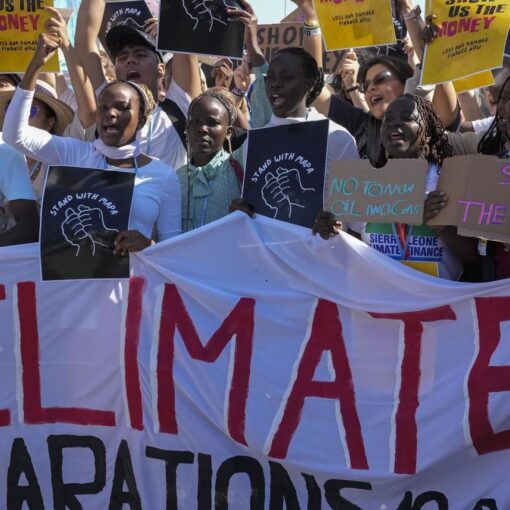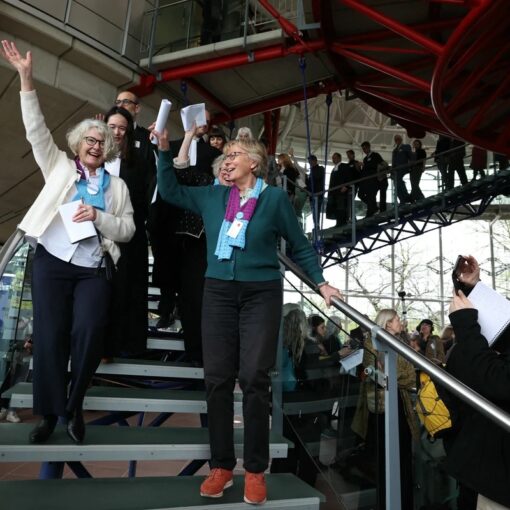Each month, Arnold & Porter and the Center for Climate Change Law collect and summarize developments in climate-related litigation, which we also add to our U.S. and non-US climate litigation charts. The May additions are listed below. (If you know of any cases we’ve missed, please email us at columbiaclimate at gmail dot com.)
FEATURED DECISION
American Tradition Institute v. Rector and Visitors of the University of Virginia, Record No. 130934 (Va. Apr. 17, 2014): added to the “Climate Change Protestors and Scientists” slide. The Supreme Court of Virginia affirmed a lower court ruling that shielded certain documents produced or received by climate scientist Michael Mann while he was a professor at the University of Virginia (UVA) from disclosure under Virginia’s Freedom of Information Act (VFOIA). The case turned on the meaning of “proprietary” in VFOIA’s exemption for “[d]ata, records or information of a proprietary nature produced or collected by or for faculty or staff of public institutions of higher education … in the conduct of or as a result of study or research on medical, scientific, technical or scholarly issues.” The Virginia Supreme Court rejected the American Tradition Institute’s (ATI’s) “narrow construction” of “proprietary,” which ATI said required financial competitive advantage. The court said this interpretation was not consistent with legislative intent to protect public educational institutions from being placed at a competitive disadvantage compared to private universities and colleges. The court concluded that the legislative concern was motivated by a “broader notion” of competitive disadvantage that extended beyond financial injury to “harm to university-wide research efforts, damage to faculty recruitment and retention, undermining of faculty expectations of privacy and confidentiality, and impairment of free thought and expression.” The court cited at length the affidavit of a UVA administrator who had also served as an administrator at a private university, who said that “[i]f U.S. scientists at public institutions lose the ability to protect their communications with faculty at other institutions, their ability to collaborate will be gravely harmed.”
DECISIONS AND SETTLEMENTS
North Dakota v. Heydinger, Case No. No. 11-cv-3232 (SRN/SER) (D. Minn. Apr. 18, 2014): added to the “Challenges to State Action” slide. The federal district court for the District of Minnesota enjoined the State of Minnesota from enforcing provisions of the Next Generation Energy Act (NGEA) that barred both importing energy from a “new large energy facility” outside Minnesota and entering into new long-term power purchase agreements, where such activities would contribute to statewide carbon dioxide emissions. The court ruled that these prohibitions were a “classic example” of extraterritorial regulation in violation of the dormant Commerce Clause. The court said that due to how the electricity industry operates, the law could require out-of-state entities to comply with Minnesota requirements and even seek regulatory approval from Minnesota before engaging in power transactions outside Minnesota. The court noted that “[u]nlike … tangible products, electricity cannot be shipped directly from Point A to Point B. MISO [the Midcontinent Independent System Operator, the regional transmission organization of which Minnesota is a member] does not match buyers to sellers, and once electricity enters the grid, it is indistinguishable from the rest of the electricity in the grid. Therefore, a North Dakota generation-and-transmission cooperative cannot ensure that the coal-generated electricity that it injects into the MISO grid is used only to serve its North Dakota members and not its Minnesota members. Consequentially, in order to ensure compliance with [the NGEA provisions], out-of-state parties must conduct their out-of-state business according to Minnesota’s terms—i.e., engaging in no transactions involving power or capacity that would contribute to or increase Minnesota’s statewide power sector carbon dioxide emissions.”.
Communities for a Better Environment v. Environmental Protection Agency, No. 11-1423 (D.C. Cir. Apr. 11, 2014): added to the “Force Government to Act/Clean Air Act” slide. The D.C. Circuit upheld the U.S. Environmental Protection Agency’s (EPA’s) determination not to establish a secondary standard for carbon monoxide, finding that petitioners did not have standing to challenge the determination because they had not presented sufficient evidence of a link between carbon monoxide at the levels permitted by EPA and a worsening of global warming. In its review of the standards for carbon monoxide, EPA had conducted an evaluation of the causal connection between carbon monoxide and climate change and concluded that it could not determine whether a secondary standard for carbon monoxide would affect climate.
Mississippi Power Co. v. Mississippi Public Service Commission, No. 2013-CC-00682-SCT (Miss. Apr. 10, 2014): added to the “Force Government to Act/Other Statutes” slide. The Supreme Court of Mississippi ruled that certain documents concerning “the long term natural gas price forecast and a forecast of the economic impact of pending federal legislation of greenhouse gas emissions” that Mississippi Power Co. (Mississippi Power) had filed in January 2009 with the Mississippi Public Service Commission (MPSC) should be disclosed. Mississippi Power had filed the documents in connection with a certificate of public convenience and necessity proceeding for a proposed power plant in Kemper County, Mississippi. Bigger Pie Forum, a media outlet covering (and opposed to) the project, had sought the documents pursuant to the Mississippi Public Records Act. Mississippi Power had marked the documents at issue as confidential, but it came to light that it had shared information responsive to the records request with the Wall Street Journal. Mississippi Power, however, continued to assert that since the information provided to the Wall Street Journal was from a December 2009 filing with MPSC, an earlier filing in January 2009 that contained similar information remained confidential. The Mississippi Supreme Court disagreed, stating that “Mississippi Power’s revelation of natural gas price forecasts and CO2 cost assumptions provided to the Commission in December 2009 militates against the argument that a similar forecast submitted in January 2009 would be entitled to confidential, secret status.”
Thrun v. Cuomo, Mo. No. 2014-138 (N.Y. Apr. 3, 2014): added to the “Challenges to State Action” slide. The New York Court of Appeals denied a motion for leave to appeal an Appellate Division decision dismissing a challenge to New York’s participation in the Regional Greenhouse Gas Initiative (RGGI). The Appellate Division ruled in December 2013 that challenges to the validity of New York’s RGGI regulations were time-barred and that the challenge to then-Governor Pataki’s signing of the RGGI memorandum of understanding was moot.
WildEarth Guardians v. Bureau of Land Management, No. 1:11-cv-01481-RJL (D.D.C. Mar. 30, 2014): added to the “Stop Government Action/NEPA” slide. The federal district court for the District of Columbia granted the U.S. Bureau of Land Management’s (BLM’s) motion for summary judgment in this challenge to BLM’s decision to authorize competitive lease sales in two coal tracts in the Wyoming Powder River Basin. As a threshold matter, the court concluded that plaintiffs had standing to bring all of their claims, including those related to climate change. After concluding that plaintiffs had standing stemming from injuries to aesthetic and recreational interests from local pollution to challenge BLM’s consideration of local pollution impacts, the court expressed relief that it “need not navigate the troubled waters of the ‘derivative’ standing issue, nor … decide whether plaintiffs have established a separate injury in fact caused by climate change” because the D.C. Circuit had made clear in a similar case—WildEarth Guardians v. Jewell, No. 12-5300—that plaintiffs had standing to challenge BLM’s consideration of climate change impacts on a procedural injury theory. On the merits, however, the court rejected plaintiffs’ claims under both the National Environmental Policy Act (NEPA) and the Federal Land Policy Management Act. Under NEPA, the court was not persuaded that BLM had not sufficiently considered the impacts of greenhouse gas emissions from mining operations and from the subsequent combustion of the coal. The court concluded that “the level of specificity plaintiffs would prefer in BLM’s analysis is neither possible based on current science, nor required by law.” The court said that BLM’s evaluation of greenhouse gas emissions associated with its actions as a percentage of statewide and nationwide emissions was “a permissible and adequate approach,” given that current climate science did not allow for “specific linkage between particular [greenhouse gas] emissions and particular climate change impacts.” The court also rejected plaintiffs’ contention that BLM was obligated to consider alternatives that would reduce greenhouse gas emissions such as emissions capture and sequestration, more efficient mine hauling trucks, and carbon offsets.
Protect Our Communities Foundation v. Jewell, No. 3:13-cv-00575-JLS-JMA (S.D. Cal. Mar. 25, 2014): added to the “Stop Government Action/NEPA” slide. The federal district court for the Southern District of California rejected a challenge to BLM actions authorizing the Tule Wind Project, a utility-scale wind energy facility on public lands in San Diego County. The court was not persuaded that BLM violated NEPA, the Migratory Bird Treaty Act, or the Bald and Golden Eagles Protection Act. Among other things, the court rejected plaintiffs’ claims that BLM had failed to take a hard look at climate change impacts, finding that BLM did not have to indicate the number of megawatt-hours of energy the project would generate each year to support its conclusion that the project would “potentially” decrease overall emissions associated with electrical generation in California. Nor did BLM have to assess the project’s “life-cycle” emissions impacts by taking into account emissions from off-site equipment manufacture and transportation—the court deemed such an assessment “largely speculative.” The court also agreed with the defendants that BLM had sufficiently addressed a distributed generation alternative favored by plaintiffs that would have relied on widespread development of “rooftop solar” systems on residential and commercial structures in San Diego County, as well as development of other small-scale renewable energy sources.
In re Energy Answers Arecibo LLC (EAB Mar. 25, 2014): added to the “Stop Government Action/Project Challenges” slide. In response to EPA Region 2’s Motion for Limited Voluntary Remand, the Environmental Appeals Board (EAB) remanded a Clean Air Act Prevention of Significant Deterioration (PSD) permit issued for a resource recovery facility in Puerto Rico. EAB indicated that Region 2 should incorporate regulation of biogenic greenhouse gas emissions in the permit in a manner consistent with the revisions proposed in Region 2’s motion. Region 2 had issued the permit prior to the D.C. Circuit’s decision in Center for Biological Diversity v. EPA, No. 11-1101 (July 12, 2013), which vacated EPA’s rule deferring regulation of biogenic greenhouse gases under the PSD program. EAB concluded that the amendments to the permit would not result in any change to the control technology or the total carbon dioxide emissions. EAB also concluded that the permit need not be reopened for public comment on remand, noting, among other factors, that EPA Region 2 already had taken biogenic carbon dioxide emissions into account in its best available control technology analysis.
NEW CASES, MOTIONS, AND NOTICES
San Diego Coastkeeper v. San Diego County Water Authority, No. 37-2014-00013216-CU-JR-CTL (Cal. Super. Ct., filed Apr. 25, 2014): added to the “State NEPAs” slide. An environmental organization filed a lawsuit alleging that the San Diego County Water Authority (SDCWA) failed to comply with the California Environmental Quality Act (CEQA) when it approved updates to its long-term plan for water development and conservation. The two elements of the plan, which SDCWA called “a road map through 2035 for future capital projects,” were an update to the 2003 Regional Water Facilities Master Plan and a Climate Action Plan (CAP). Petitioner alleged a number of shortcomings related to climate change, including that the CAP “did not accurately account for current or projected future emissions” or “adequately provide for emission reduction goals and energy conservation opportunities.” Petitioner also alleged that the Supplemental Program Environmental Impact Report (SPEIR) did not comply with AB 32 (California’s greenhouse gas emissions reductions law) and that it failed to ensure consistency with Executive Order S-3-05 (a precursor to AB 32 that set greenhouse gas emissions reductions targets). Petitioner also asserted that the SPEIR did not use proper criteria to assess climate change impacts, that it failed to consider health impacts related to climate change, and that the CAP was not a qualified greenhouse gas reduction plan under CEQA guidelines.
Illinois Farmers Insurance Co. v. Metropolitan Water Reclamation District of Greater Chicago, No. 2014CH06608 (Ill. Cir. Ct., filed Apr. 16, 2014): added to the “Adaptation” slide. Insurance companies sued the water reclamation district for greater Chicago, Cook County, the City of Chicago and numerous other cities, towns, and villages in Illinois in a class action alleging that the municipalities’ failures to implement reasonable stormwater management practices and increase stormwater capacity resulted in increased payouts to the plaintiffs’ insureds after heavy rains in April 2013. The rains resulted in sewer water flooding the insureds’ properties. Plaintiffs alleged that the rainfall was within the anticipated 100-year rainfall return frequency—or, alternatively, that it was within the climate change-adjusted 100-year rainfall return frequency predicted by the 2008 Chicago Climate Action Plan. They asserted claims of negligent maintenance liability, failure to remedy known dangerous conditions, and takings without just compensation.
Mississippi Insurance Department v. United States Department of Homeland Security, No. 1:13-cv-379-LG-JMR (S.D. Miss. Apr. 14, 2014): added to the “Adaptation” slide. After President Obama signed legislation—The Homeowner Flood Insurance Affordability Act of 2014, Pub. L. No. 113-89—in March 2014 rolling back flood insurance reform measures enacted in the Biggert-Waters Flood Insurance Reform and Modernization Act of 2012, the Mississippi Insurance Department filed a notice of voluntary dismissal to withdraw its lawsuit challenging flood insurance rate increases. The dismissal is without prejudice, and the Mississippi Insurance Commissioner said that the agency would refile the lawsuit if implementation of the new legislation does not address affordability concerns.
Communities for a Better Environment v. Bay Area Air Quality Management District, No. CPF-14-513557 (Cal. Super. Ct., filed Mar. 27, 2014): added to the “State NEPAs” slide. Environmental organizations filed a lawsuit in California Superior Court challenging the granting by the Bay Area Air Quality Management District (BAAQMD) of a permit to Kinder Morgan to conduct crude-by-rail operations. The organizations allege that the Kinder Morgan operations will bring North Dakotan Bakken crude oil to Bay Area refineries in the same types of rail cars that were involved in the explosive train derailment in Québec in July 2013. They allege that the BAAQMD permit was issued in a “clandestine” manner “without any notice or public process whatsoever.” They claim that BAAQMD “eschewed” its CEQA obligations by designating the project as “ministerial” and thereby failed to consider a number of impacts, including significant increases in greenhouse gas emissions.
International Center for Technology Assessment v. Council on Environmental Quality, No. 1:14-cv-00549 (D.D.C., filed Apr. 2, 2014): added to the “Force Government to Act/Other Statutes” slide. Two non-profit organizations filed an action in the federal district court for the District of Columbia seeking to compel the Council on Environmental Quality (CEQ) to respond to a 2008 petition in which plaintiff International Center for Technology Assessment asked CEQ to require consideration of climate change impacts in environmental review documents prepared to comply with NEPA. The complaint alleged that while CEQ published draft guidance in 2010 that would affirm that agencies must consider climate change impacts in their NEPA reviews, CEQ never finalized the guidance or otherwise “formally responded” or took “meaningful action” in response to the 2008 petition. Plaintiffs claim that this lack of response violated the Administrative Procedure Act.
Here are recent additions to the Non-U.S. Climate Litigation Chart.
Sustainable Shetland v. Scottish Minister (Outer House, Court of Session [2013] CSOH 158 (United Kingdom))Sustainable Shetland challenged the Scottish Minister’s approval of an application by Viking Energy for the construction and operation of a 457 megawatt Wind Farm on a number of grounds. In granting the application, the Scottish Ministers had determined that the advantages of meeting renewable energy and climate change goals and economic impacts outweighed negative consequences. The court accepted Sustainable Shetland’s argument that the Scottish Ministers had no power under the Energy Power Act 1989 to grant the consent because Viking Energy did not yet hold an electricity generation license. In addition, the court found that the Ministers had failed to take proper account of their obligations under the Wild Birds Directive 2009.—Added to “Renewable Projects” slide.




